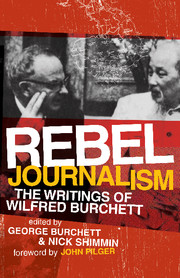Book contents
- Frontmatter
- Contents
- List of Photographs
- Acknowledgements
- Foreword by John Pilger
- Foreword by Gavan McCormack
- Introduction
- 1 The Atomic Plague [1945]
- 2 With Mick Griffith to the Plaine des Lacs [1941]
- 3 Who is Wingate Anyway? [1944]
- 4 The Trial of Cardinal Mindszenty [1951]
- 5 Liberty in Eastern Europe [1951]
- 6 The Microbe War [1953]
- 7 Koje Unscreened [1953]
- 8 The Ball-Point Pen Murders [1954]
- 9 South of the 17th Parallel [1955]
- 10 Front-Line Village [1959]
- 11 Welcome Home [1961]
- 12 Gagarin: The First Interview with Western Journalists [1961]
- 13 Virgin Lands [1962]
- 14 Lilac and Outer Space [1962]
- 15 War Against Trees [1963]
- 16 The Tragedy of South Vietnam's Ethnic Minorities [1964]
- 17 Interview with General Vo Nguyen Giap (April 13, 1964)
- 18 A Fortified Hamlet [1965]
- 19 Patriots & Mercenaries [1965]
- 20 At Ground Level [1966]
- 21 A Spurned Olive Branch [1967/1977]
- 22 Personal Leader [1968]
- 23 The Tet of Peace [1973/1977]
- 24 ‘Something from Nothing’ Township [1976]
- 25 Evaluating the Past [1976]
- 26 Mercenaries: British Export Model [1977]
- 27 The Geneva Conference [1978]
- 28 How to be a Good Khmer Rouge [1981]
- 29 China Prepares to Attack Vietnam [1981]
- 30 Afterword [1983]
- Notes
- Bibliography
- Index
16 - The Tragedy of South Vietnam's Ethnic Minorities [1964]
Published online by Cambridge University Press: 22 September 2009
- Frontmatter
- Contents
- List of Photographs
- Acknowledgements
- Foreword by John Pilger
- Foreword by Gavan McCormack
- Introduction
- 1 The Atomic Plague [1945]
- 2 With Mick Griffith to the Plaine des Lacs [1941]
- 3 Who is Wingate Anyway? [1944]
- 4 The Trial of Cardinal Mindszenty [1951]
- 5 Liberty in Eastern Europe [1951]
- 6 The Microbe War [1953]
- 7 Koje Unscreened [1953]
- 8 The Ball-Point Pen Murders [1954]
- 9 South of the 17th Parallel [1955]
- 10 Front-Line Village [1959]
- 11 Welcome Home [1961]
- 12 Gagarin: The First Interview with Western Journalists [1961]
- 13 Virgin Lands [1962]
- 14 Lilac and Outer Space [1962]
- 15 War Against Trees [1963]
- 16 The Tragedy of South Vietnam's Ethnic Minorities [1964]
- 17 Interview with General Vo Nguyen Giap (April 13, 1964)
- 18 A Fortified Hamlet [1965]
- 19 Patriots & Mercenaries [1965]
- 20 At Ground Level [1966]
- 21 A Spurned Olive Branch [1967/1977]
- 22 Personal Leader [1968]
- 23 The Tet of Peace [1973/1977]
- 24 ‘Something from Nothing’ Township [1976]
- 25 Evaluating the Past [1976]
- 26 Mercenaries: British Export Model [1977]
- 27 The Geneva Conference [1978]
- 28 How to be a Good Khmer Rouge [1981]
- 29 China Prepares to Attack Vietnam [1981]
- 30 Afterword [1983]
- Notes
- Bibliography
- Index
Summary
My Visit to the Liberated Zones of South Vietnam was a collection and adaptation of articles Burchett had dispatched to the New York National Guardian during his visits to Southeast Asia in the early 1960s. The following chapter begins his examination of US ‘Special Warfare’, a subject he was to expand on subsequently (for example, see Chapter 18). In this case he deals specifically with the experiences of ethnic minorities in Vietnam.
There are more than 50 identified minorities in Vietnam, most of which live very different lives in the highlands from the dominant ethnic Vietnamese who populate the coast and the lowlands. The variety of languages and religious practices among Vietnam's minorities reflect the country's ethnic complexity and explain the difficulties they have presented for various Vietnamese governments.
After the mid-1950s, North and South Vietnam dealt with the minorities differently. The Hanoi regime understood the traditional separatist attitudes of the tribal minorities and set up two autonomous zones for the highlanders in return for their acceptance of Hanoi's political control. In contrast, the Saigon administration under Ngo Dinh Diem opted for direct, centralised control of the tribal minorities and incurred their enduring wrath by seizing ancestral lands for the resettlement of displaced Catholic refugees from the North.
After Diem's assassination in 1963, successive Saigon administrations granted a modicum of autonomy, but the ‘strategic hamlet’ program largely embittered its minority participants. In an act of resistance, some tribal leaders gathered in 1964 to announce the formation of the Unified Front for the Struggle of Oppressed Races, and some understanding of the motivation behind this can be gleaned from Burchett's description of their experiences in the following chapter.
- Type
- Chapter
- Information
- Rebel JournalismThe Writings of Wilfred Burchett, pp. 168 - 174Publisher: Cambridge University PressPrint publication year: 2007



